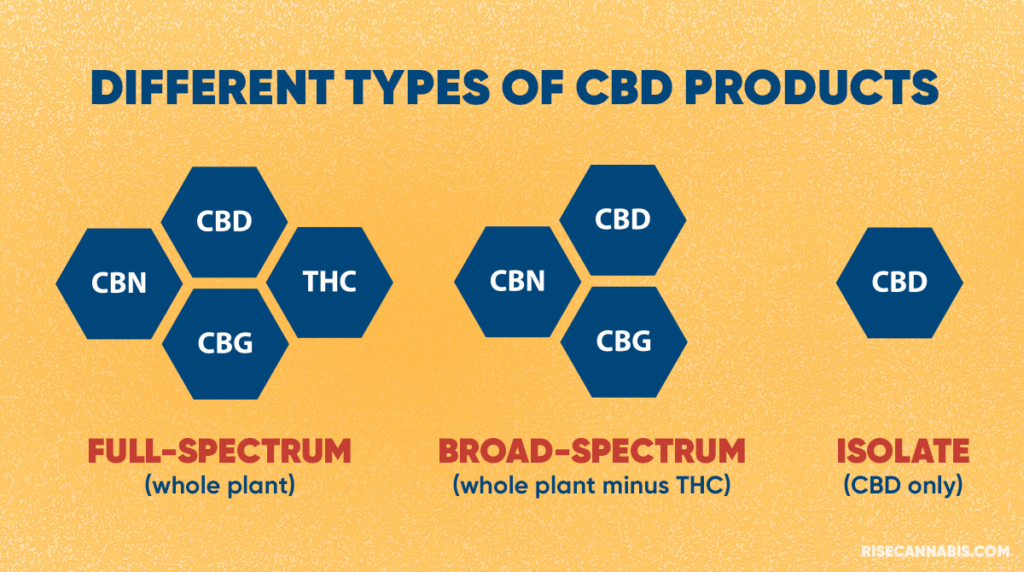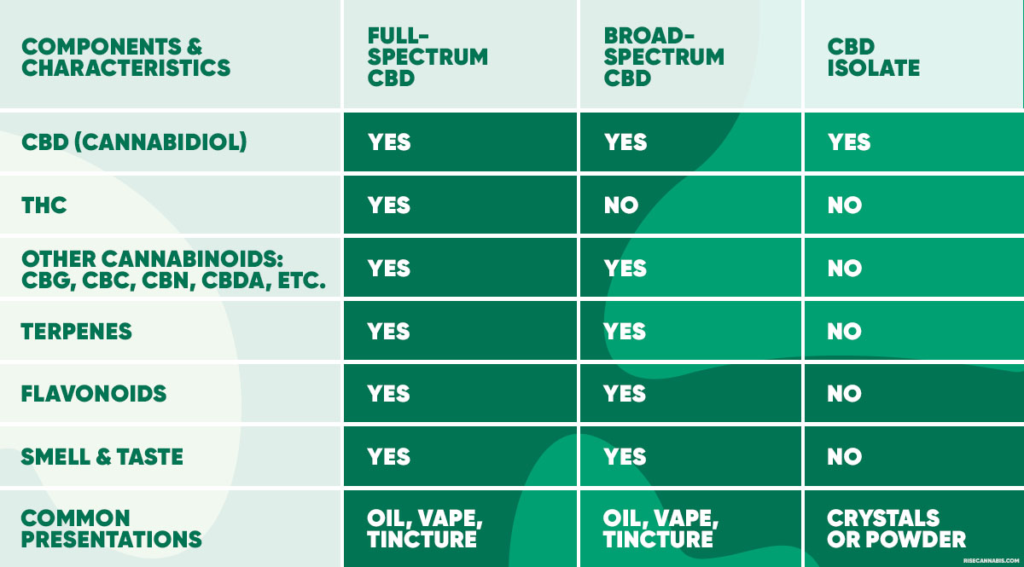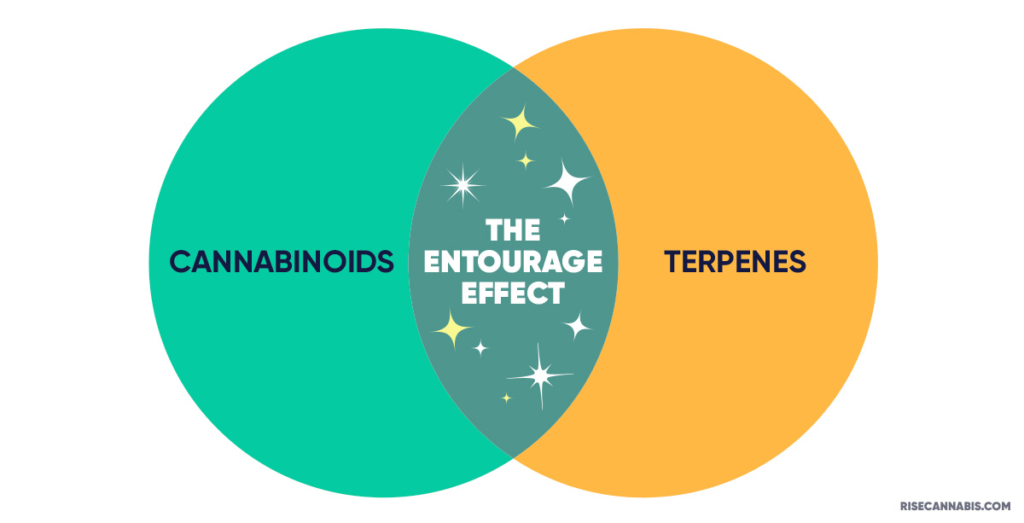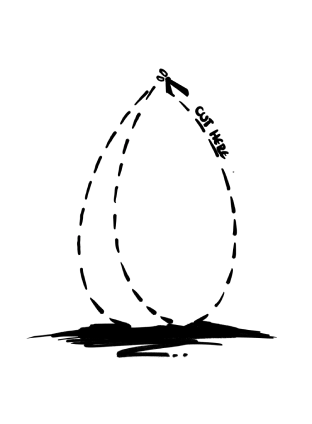Highlights:
- Full spectrum CBD contains a variety of compounds found in the cannabis plant.
- The presence of cannabinoids, terpenes, and other molecules in full spectrum CBD can boost its health benefits.
- The beneficial effects of full spectrum CBD oil can vary from person to person and it takes guidance and experimentation to learn what is best for you.
CBD is everywhere these days, in every shape and form. Even if you have some experience, the variety can sometimes be overwhelming.
Ready to find the CBD product of your dreams? This detailed guide will help you catch up with the potential benefits of one of the most popular cannabis products: full spectrum CBD.
If you want to know more about full spectrum CBD and what it is good for, read on to learn about its components, how it differentiates from broad spectrum and isolated CBD, and what it can do for your health and well-being.
What is CBD?
CBD is one of the many cannabinoids found in marijuana and hemp plants. Pure CBD does not contain THC, the cannabinoid responsible for the psychoactive effects of marijuana. Actually, CBD is often extracted from hemp, which is extremely low in THC.
As you may have guessed, cannabis has other components aside from cannabinoids, and their presence can alter the effects of CBD. So, it may help with different conditions depending on what terpenes, flavonoids, and other cannabis compounds it is interacting with.
Did you know the human body is full of cannabinoid receptors? That’s right. We have a system called the endocannabinoid system, ready to receive CBD and put it to good use.
Research has linked CBD to a surprising number of health benefits. People often use CBD to help with inflammation and pain, and the FDA has approved a CBD-based drug to treat epilepsy. [Source]
Hemp-derived CBD is legal in all U.S. states, while marijuana-derived CBD is only legal in states that have legalized cannabis. [Source]
The most common formulation of CBD is CBD oil, but you can also find it in many other forms, including capsules, vaporized liquids, tinctures, and ointments.

Types of CBD
If you are looking to experiment with CBD, you may come across three different types: full spectrum CBD, broad spectrum CBD, and CBD isolate.
The terminology may sound complicated, but it is actually quite simple. Scientists have classified CBD based on what other compounds it contains, aside from CBD.
The main difference is that CBD isolate is pure CBD, while full spectrum and broad spectrum CBD feature a variety of other components. The main difference between full and broad spectrum CBD is that full spectrum CBD contains THC while broad spectrum CBD doesn’t.
Full spectrum CBD contains CBD and all of the other cannabinoids, terpenes, flavonoids, and fatty acids present in the cannabis plant, including THC. The extraction process produces an ‘impure’ form of CBD containing all these compounds.
Federally legal full spectrum CBD contains up to 0.3% of THC. This small amount of THC will not produce the effect usually associated with THC, but it may show up in drug tests.
The terpenes and cannabinoids in full spectrum CBD have been linked to many health benefits, including neuropathic pain relief. Research also suggests that CBD is more beneficial when THC and other cannabinoids are present.
Full Spectrum CBD vs. Broad Spectrum CBD vs. CBD Isolate
CBD can have different effects when taken in pure form, in the presence of THC, or in the presence of a variety of other compounds.
If you have no experience with THC, you may want to begin by experimenting with CBD isolate or broad-spectrum CBD products. If you venture into full -spectrum CBD, rest assured that as long as THC content remains below the 0.3% mark, you are unlikely to experience any significant psychoactive effects.
If you haven’t made up your mind about trying full spectrum CBD, it can be helpful to understand how it compares to the two other types of CBD in terms of its components, benefits, and associated effects.

What Is Full Spectrum CBD Oil?
When you think of CBD, you are probably thinking of its most common form, CBD oil. Full spectrum and broad-spectrum CBD are available in oil form, but you may also purchase them as tinctures and in other formulations.
CBD tinctures are made by extracting CBD from the cannabis plant and activating it with alcohol compounds. CBD oils are made by combining CBD extract with a carrier oil like coconut oil or hempseed oil.
What does Full Spectrum CBD Contain?
Now that you know what full spectrum CBD is, let’s take a closer look at its chemical makeup. Cannabis is a very complex plant with over 100 cannabinoids and 568 unique molecules.
Full-spectrum CBD contains every type of compound found in the cannabis plant, including cannabinoids, terpenes, flavonoids, fatty acids, phenols, and other miscellaneous compounds.
Cannabinoids
The main component of full spectrum CBD is naturally CBD (Cannabidiol). Other common cannabinoids present in the full spectrum version of CBD include
- THC (Tetrahydrocannabinol)
- CBG (Cannabigerol)
- CBN (Cannabinol)
- CBC (Cannabichromene)
- THCA (Tetrahydrocannabinolic acid)
- CBDA (Cannabidiolic acid synthase)
- THCV (Tetrahydrocannabivarin)
- CBND (Cannabinodiol)
We commonly refer to phytocannabinoids (plant cannabinoids) as cannabinoids. In reality, these are not the only types of cannabinoids.
If you were surprised to learn we have special receptors for cannabis in our bodies, this will blow your mind: our bodies produce their own cannabinoids. These are known as endocannabinoids. The endocannabinoid system helps regulate our immune responses, pain, mood, and stress. Not surprisingly, research has linked phytocannabinoids to the same types of benefits.
Terpenes
Terpenes are hydrocarbons found in conifers, citrus trees, cannabis, and other plants. The 150 terpenes found in cannabis are responsible for the plant’s singular aroma. They include limonene, caryophyllene, pinene, myrcene, and terpinolene.
Even if you never heard of terpenes before, you could surely recognize them with your eyes closed. For example, you could certainly tell R-limonene, responsible for the smell of oranges, apart from S-limonene, responsible for the smell of lemons.
Different marijuana strains have different terpene mixes. But these aromatic compounds are not only there to make plants smell nice; they can also be beneficial for human health. Studies have shown certain terpenes may block tumor growth, and their presence can also enhance the effects of full spectrum CBD. [Source]
Flavonoids
Flavonoids are plant compounds found not only in cannabis, but also in fruits, vegetables, cocoa, tea, and wine.
The flavonoids in cannabis have anti-diabetic, anti-inflammatory, antioxidant, anti-cancer, and neuroprotective potential.
There are over 20 flavonoids in cannabis, including cannflavins, quercetin, apigenin, and kaempferol.
- Cannflavins are only found in the cannabis plant.
- Quercetin is present in kale, cocoa, citrus, and red wine.
- Oranges, cilantro, onions, and basil contain apigenin, while kaempferol is present in beans, spinach, ginger, and tea.
Fun fact: ever wondered why roses are so brightly colored? The secret of their lovely hue is none other than kaempferol.
Benefits of Full Spectrum CBD
Full-spectrum CBD may benefit numerous conditions associated with inflammation and pain. The interactions between CBD, THC, terpenes, and flavonoids are so complex that scientists are only beginning to understand them.
The Entourage Effect
Every superstar needs an entourage, and CBD is not the exception. The benefits of CBD are likely amplified through the presence of other compounds found in full spectrum CBD. In fact, terpenes and flavonoids may boost the positive effects of CBD in ways science is still trying to understand. [Source]
This amplification of the benefits of CBD through the presence of other cannabinoids, terpenes, and flavonoids is known as the “entourage effect.”
The synergy between CBD and THC appears to be quite powerful, as CBD allows consumers to enjoy the multiple benefits of THC while neutralizing its psychoactive effects.

What Is Full Spectrum CBD Oil Used for?
Although the jury is still out in terms of official recognition of what full -spectrum CBD is good for, the American public has already reached a verdict. According to a 2019 Gallup poll, 14% percent of Americans use CBD products. Moreover, 40% of them report using CBD for pain, 20% for anxiety, and 11% for sleep.
CBD trials show that Americans are using full spectrum CBD to help with anxiety, chronic pain, sleep disorders.
What to Keep in Mind When Choosing Full Spectrum CBD Products
Don’t let full spectrum CBD’s many beneficial qualities get in the way of your best judgment. Full spectrum CBD might be extremely beneficial to your health, but it is not for everyone.
Full Spectrum CBD Contains THC
Since it contains a trace amount of THC, some consumers may choose to avoid full spectrum CBD. Still, at 0.3%, the percentage of THC in full spectrum CBD is not significant, and it will not leave any intoxicating effects.
Full Spectrum CBD May Result in Positive Drug Tests
If you are taking full spectrum CBD and have to undergo a drug test, it may be positive. This is no reason to stop taking CBD, but it is something to consider if you want to enjoy the product’s multiple benefits.
Full Spectrum CBD Is Not Legal Everywhere
There are two different species of cannabis: hemp and marijuana. Hemp is low in THC, while marijuana is high, no pun intended. Marijuana is an illegal substance according to the DEA, but hemp is legal. Thus, full spectrum CBD extracted from hemp is federally legal, but the same extract is supposedly illegal if it comes from a marijuana plant.
This sounds more complicated than it actually is. In April 2022, the DEA stated that marijuana seeds are considered legal as long as their THC content does not exceed 0.3%.
At the state level, full spectrum CBD products are legal in almost every U.S. state as long as they either contain less than 0.3% of THC or are approved by the FDA.

Finding the CBD Product that Is Right for You
You can find many ways to harness the benefits of full spectrum CBD. Ask yourself, are you OK with a negligible amount of THC? If the answer is yes, you are probably a great candidate to try full spectrum CBD.
As we mentioned before the main benefit of full spectrum CBD is the same as it’s main downside – it contains other compounds present in the cannabis plant, including THC. So you can benefit from the entourage effect caused by the combination of these compounds but you also need to keep in mind that even if the THC levels are usually very low, it’s still present.
If you want to learn about the potential benefits of CBD for your specific condition, you can reach out to the nearest RISE dispensary for a free consultation from our friendly staff.
Full Spectrum CBD FAQ
Is Full Spectrum CBD Legal?
Full spectrum CBD with up to 0.3% of THC is federally legal. In some states, CBD products may legally contain more percentage of THC. Please always check the local laws. You can check our map of marijuana laws.
Is Full Spectrum CBD Right for You?
Time for your Shakespearean dilemma. To CBD or not to CBD? And, in case you do, should you go full spectrum? There is no straight answer to these questions, but if you want to enjoy the full health benefits of the cannabis plant, full spectrum CBD is the way to go. Ask your doctor to confirm you can safely consume full spectrum CBD.
Is Full Spectrum CBD Psychoactive?
Full spectrum CBD contains psychoactive compounds like CBD and THC.
Is Full Spectrum CBD Intoxicating?
Full spectrum CBD is very low on THC and cannot typically get you intoxicated. However, if you take a very large dose, you may experience some of the intoxicating effects of THC. Your level of experience with cannabis will also play a role. If you are very familiar with marijuana, you are also very unlikely to get intoxicated with a low dose of THC.
Where to Buy Full Spectrum CBD?
Typically, full spectrum CBD is available in the form of CBD oil, tinctures, vapes, or CBD gummies. You can purchase full spectrum CBD from one of our dispensaries or online.
How Do People Take Full Spectrum CBD, Broad Spectrum CBD, and CBD Isolate?
People usually take full-spectrum or broad- spectrum CBD oil, CBD crystals, and CBD powder orally or sublingually. Whether you are taking full spectrum, broad spectrum, or isolate CBD, sublingual administration typically leads to faster action.
What Is CBD Isolate Powder?
Because isolated CBD is pure, it is available in its natural form, as crystals. These are often pulverized and sold as a powder. This is usually sold as ingredients to be used in cannabis manufacturing.
Do you have any more questions about full spectrum CBD, what it is good for, or what dosage to take? Do not hesitate to contact one of our friendly patient care specialists or cannabis pharmacists at your local RISE dispensary today. Find a Dispensary Near Me
Source: Rise Cannabis.

